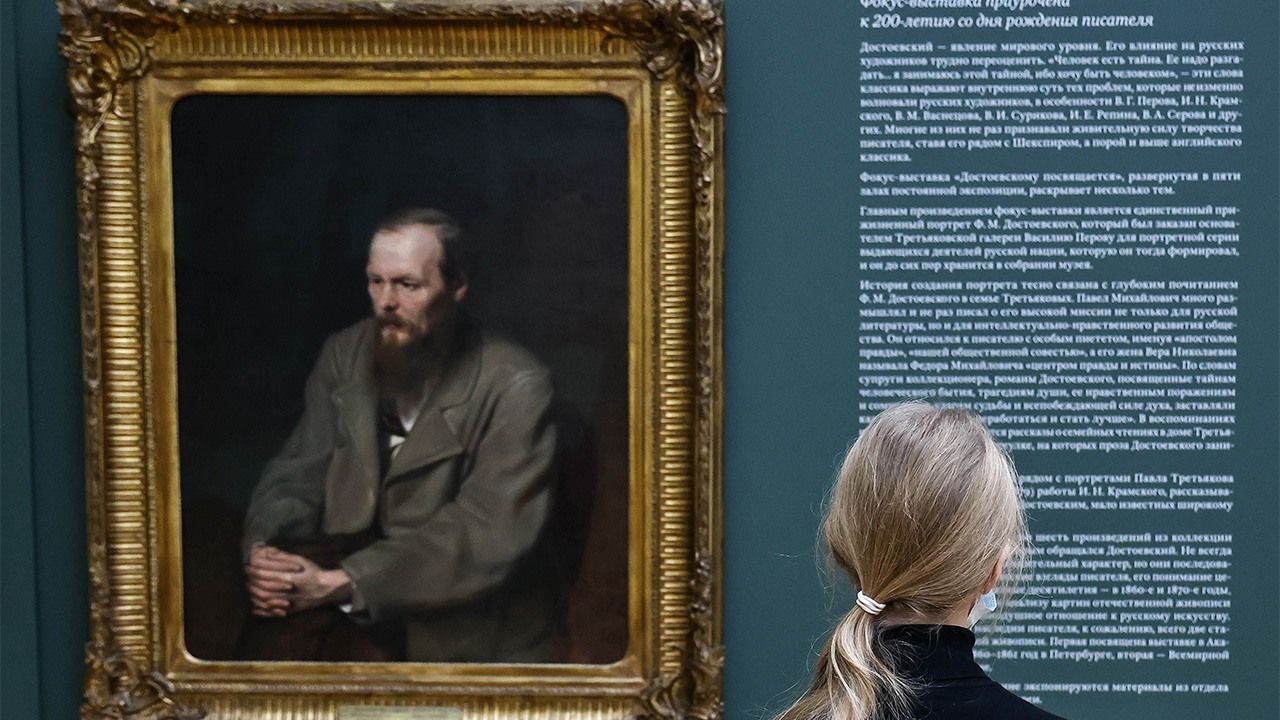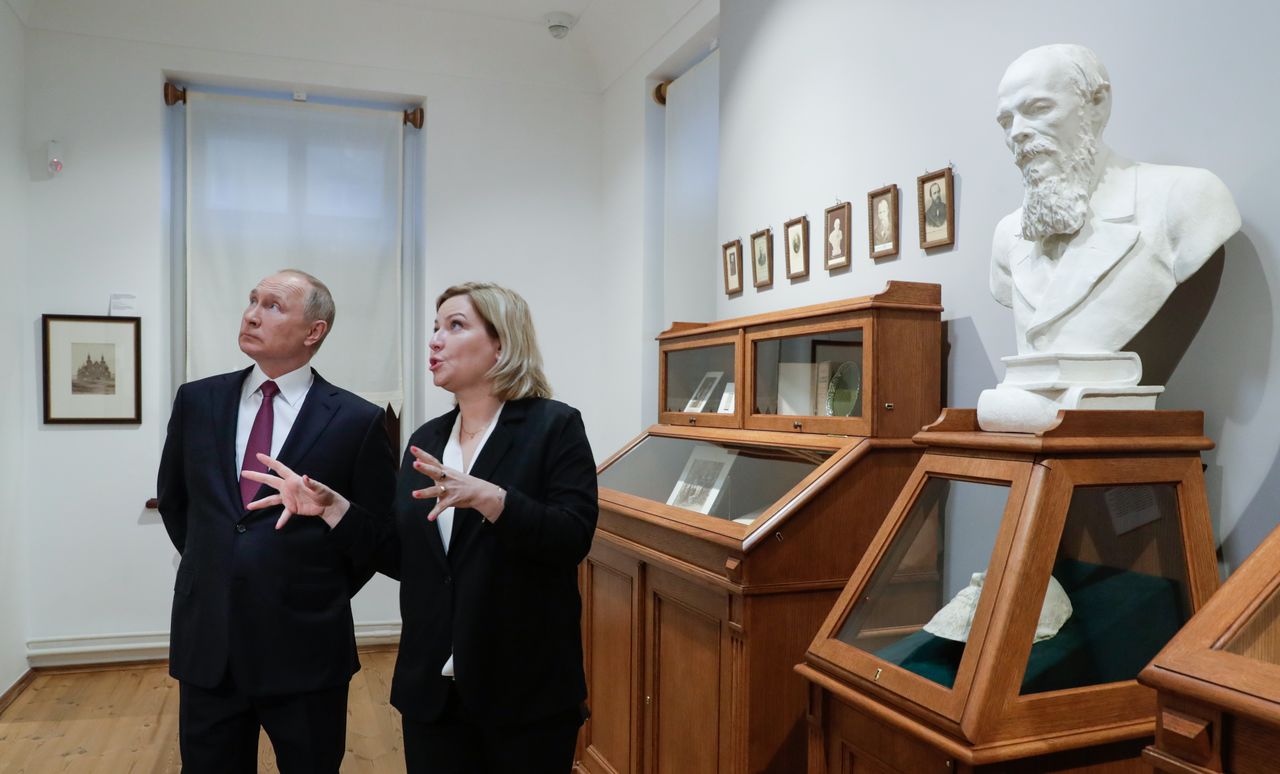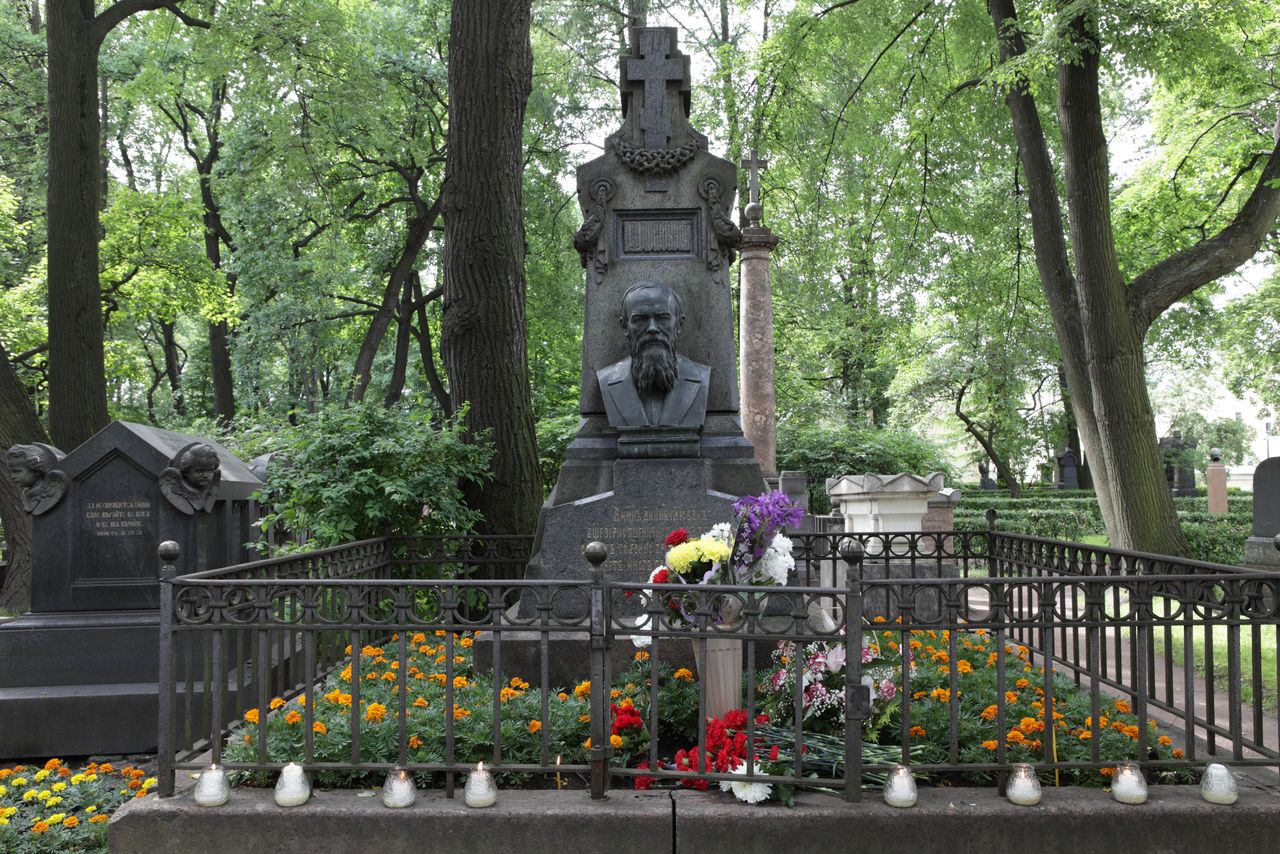
Dostoevsky’s 200th Birthday and His Living Legacy
Culture Books History- English
- 日本語
- 简体字
- 繁體字
- Français
- Español
- العربية
- Русский
A Milestone Birthday Celebrated Worldwide
INTERVIEWER The year 2021 marked Fyodor Dostoevsky’s 200th birthday. Have there been events in Russia to celebrate it?
KAMEYAMA IKUO Right around November, his birth month, there were celebrations in many areas connected to him, particularly in Moscow, where he was born, and in Kuznetsk, where he married his first wife. Moscow’s Dostoevsky Museum, which went through two years of renovations, held a reopening ceremony with Russian President Vladimir Putin in attendance. Russian state television broadcast Dostoevsky specials, and I heard there is even a new documentary film.

Russian Culture Minister Olga Lyubimova guides President Vladimir Putin on a tour of the Dostoevsky Museum in Moscow, which was renovated for the 200th anniversary of Dostoevsky‘s birth, November 11, 2021. (© Mikhail Metzel/TASS via Reuters Connect)
Many events took place elsewhere around the world, too. One of the more impressive was a project by the Dostoevsky Society of Argentina, in which someone reads each chapter of Dostoevsky’s Crime and Punishment aloud in various world languages for streaming on YouTube. I joined in as well, and read the climactic scene of Part 6, Chapter 8, where Raskolnikov kisses the earth.
The DSJ, or Dostoevsky Society of Japan, also held a gathering on December 5 to commemorate his birthday. It really showed how beloved Dostoevsky still is around the world.
INTERVIEWER Why do you think that Dostoevsky still has so many fans worldwide, and is still read today?
KAMEYAMA I would start by suggesting that the late nineteenth century, when Dostoevsky lived, has quite a lot in common with our world now at the start of the twenty-first century. In the Russia of his day, the failure of the emancipation reform of 1861 led to widening gaps between rich and poor, and society as a whole was overcome with confusion. Dostoevsky described it as the sea itself being muddied.
The same is true today, as society becomes further stratified and fragmented. Increasing polarization drives a kind of resignation, akin to fatalism, and people become increasingly anxious about society. The desire to ignore reality is expressed in outright lies, arrogance, fake news, even crimes of despair. After Russia’s 1917 revolution, many continued to insist that Vladimir Lenin still lived; today, in the twenty-first century, there is still no end to terrorism.
Of course, whenever the term “fake news” appears, one can’t help but think of former US President Donald Trump. Assuming the name of a king or a powerful person is a very Russian phenomenon. Dostoevsky’s works are full of liars and braggarts, so when I saw Trump, the first thing I thought was, “This is the Brothers Karamazov world. This is Fyodor Karamazov just as Dostoevsky described him.”
INTERVIEWER So, one reason for the love of Dostoevsky is that people are increasingly worried about society’s polarization.
KAMEYAMA I think so. Paradoxically, the internet’s spread cannot be overlooked here. You could say it has diluted our sense of existence. And even more recently, I feel like the pandemic has had a huge influence. As COVID-19 spread, a new sense of guilt arose in the human heart. Typically, people tend to think they are either perpetrators or victims, in a clear dichotomy, but I’ve come to realize that as society battles the virus, the same person can become a victim of infection by breathing in and a perpetrator of infection by breathing out.
This idea that a single person is simultaneously both victim and perpetrator reveals something fundamental about being human. In fact, this is another theme pursued by Dostoevsky. In The Brothers Karamazov, he explains that human beings are universally both perpetrators and victims, and recognizes that all society is a community of people who bear the burden of original sin.
As he says in Demons, “In sinning, each man sins against all.” The fundamental issues posed by the pandemic, the line between life and death or the choice of who lives—as in medical triage—are fundamental themes to Dostoevsky’s works, as we see in Crime and Punishment. Suicide and depression are also found in the world Dostoevsky depicted. Works like Demons or The Adolescent hold particularly vivid descriptions of youthful depression. The radical nature of these issues is another reason why Dostoevsky is so widely read.

Russian Ambassador to Japan Mikhail Galuzin (right) presents Kameyama with the Dostoevsky Star medal at the award ceremony on December 2, 2021. (Courtesy of Kameyama Ikuo)
Lessons of Crime and Punishment
INTERVIEWER What was the first work you read by Dostoevsky?
KAMEYAMA It was when I was fifteen years old, in junior high school. My father had bought us a series of world literature books, but not one of us six children ever touched them. I felt bad for my father, so I tried one out. It happened to be Crime and Punishment. I was already very curious about literature, but I actually started reading the book because I thought it would be about law. I think it was fate. Luckily for me, Crime and Punishment’s “highlight” came right away, when young Raskolnikov, the main character, kills an old woman moneylender. If that scene had come at the end of the book instead, I likely never would have finished it.
As a fifteen-year-old, I was almost sensually aroused by the murder scene, and I identified myself with Raskolnikov to the point that I dreamed about it over and over again. I recently ran into a classmate who I had not seen in fifty years, and he gave me a letter reminiscing that at the time, I told him I could not get the smell of blood off my hands. I don’t recall that at all, but that was how closely I identified with Raskolnikov. No other work has ever drawn me in as completely, not before and not since.
INTERVIEWER What did you learn as a teenager from Crime and Punishment?
KAMEYAMA I think it was that being honest is the most important thing. While Raskolnikov does not feel guilty about killing the old moneylender, he experiences tremendous loneliness and fear because he has become a criminal. That fear was the punishment that fell on Raskolnikov. For me, who identified so closely with the young man, that fear was a terrible sensation, and I felt such nervousness and tension as I read. It made me think deeply about the concepts of crime and forgiveness. Looking back, my encounter with Crime and Punishment was an enormous event in my life. I really do recommend it as a book to read in one’s youth.
INTERVIEWER Was your fascination with Crime and Punishment what drew you to focus on Dostoevsky and study him?
KAMEYAMA No, not really. In fact, I was so overpowered by Crime and Punishment that I didn’t think about reading any of his other work for quite some time. I went through William Shakespeare and Franz Kafka, then in my sophomore year of high school, I had my second meeting with Dostoevsky in The Brothers Karamazov. It was quite painful. I simply couldn’t get into the world of that book, and about a fifth of the way through I found myself utterly lost. I couldn’t figure out who it was that had committed the key patricide, which was the whole theme of the book. It was that bitter experience that has guided me in my own translation work, making me be very careful about things like the rhythm of words and the way I refer to characters.
I considered studying American literature in university, but I found out that while it was very difficult to get into the Tokyo University of Foreign Studies’ English language program, I had a better chance in Russian studies. So, I changed my ambitions, and when I entered university I started a Dostoevsky Study Group. However, that was right when the wave of student protests hit, and classes stopped after the summer break. After that, I rarely went to university and just finished out my four years reading Dostoevsky.
INTERVIEWER In Japan, Dostoevsky has been one of the most popular foreign writers since before World War II, and he continues to be loved by a great many readers. Your Brothers Karamazov translation, for example, has sold some 1.25 million copies. Why do you suppose Dostoevsky has seen such continued love in Japan?
KAMEYAMA In Japan, there were two Dostoevsky booms during the Meiji period [1868-1912], and The Brothers Karamazov being translated into Japanese for the first time in 1917 triggered a third. After that, critics like Kobayashi Hideo led fourth and fifth waves of popularity before and after World War II, and then Ōe Kenzaburō led the sixth wave around 1968, right when the student protests were at their height. Today we might say we’re in the middle of a seventh, with Murakami Haruki writing about how he was influenced by The Brothers Karamazov.
I feel like this is the biggest ever wave of popularity, and it has gone on for quite some time. The DSJ now has more than 400 members, even though we haven’t publicized it much. In August 2022, the triennial International Dostoevsky Society symposium will happen in Nagoya, and I’m hoping to hit 500 members by then.
From time to time, I look into what readers here are talking about, and I find that unlike in the West, in Japan the religious aspects of his work are not seen as so important. Indeed, many seem to go beyond any religious interpretation and take Dostoevsky’s existence as a kind of personal salvation, saying “I’m the only one who truly understands Dostoevsky!” I feel like they find the confidence to live through their understanding of the author.
In fact, when I read Crime and Punishment, I myself was convinced that no one else understood Dostoevsky as I did. Throughout his works, Dostoevsky himself warns us to “abandon pretensions,” but the more we read, the more snobbish and arrogant we become. It is like two sides of one coin, but that again is part of Dostoevsky’s magic.

Dostoevsky’s grave in Saint Petersburg, Russia. (© Jiji)
Do Not Fear Dostoevsky
INTERVIEWER Dostoevsky’s works are considered to be difficult, and many fail to grasp them. Do you have any reading suggestions for those who are just about to pick up a book, or who want to try again?
KAMEYAMA It depends on their generation. For those who are not yet of university age, I want to recommend Crime and Punishment. It’s one of the world’s greatest classics, and the story is powerful and should be readable to the end, even if the translation can be a bit difficult. For those up to their mid-thirties, I recommend The Idiot, a love story. Those into their forties who are more interested in social issues should give a go at at Demons and finally The Brothers Karamazov. That will help everyone get through his four major works.
For those really interested, I’d recommend reading The Brothers Karamazov, a story about patricide, twice: once before and once after becoming a father. The first time, you identify with the thirty-something sons, and the second time you approach it from the father’s perspective. When you’re young, you never understand what it is like for a father to be entranced by a young woman and give her all his possessions. But if you accept that the father does, indeed, have his own perspective, the way you interpret the work changes dramatically. This requires a certain amount of maturity and tolerance on the part of the reader, and I think the experience of becoming a father is a hallmark of this development.
If you are going to tackle the five major works—the four already mentioned, plus The Adolescent—it’s a good idea to study the stories beforehand, particularly that of The Brothers Karamazov. His works are quite dense and detailed, so even knowing a synopsis won’t spoil the magic. Indeed, I think it will help encourage you to read through without giving up, allowing for much deeper reading as well.
It will take at least a few days to read any of these books, so it’s an experience you will likely only have once or maybe twice in a lifetime. You will need to set aside some time, but don’t fear Dostoevsky! This 200th anniversary of his birth is an excellent chance to give it a try.
(Originally published in Japanese. Banner photo: A woman stands before a portrait of Dostoevsky at an exhibition celebrating the 200th anniversary of Dostoevsky’s birth at the State Tretyakov Gallery in Moscow on November 11, 2022. © Mikhail Tereshchenko/TASS via Reuters Connect.)
